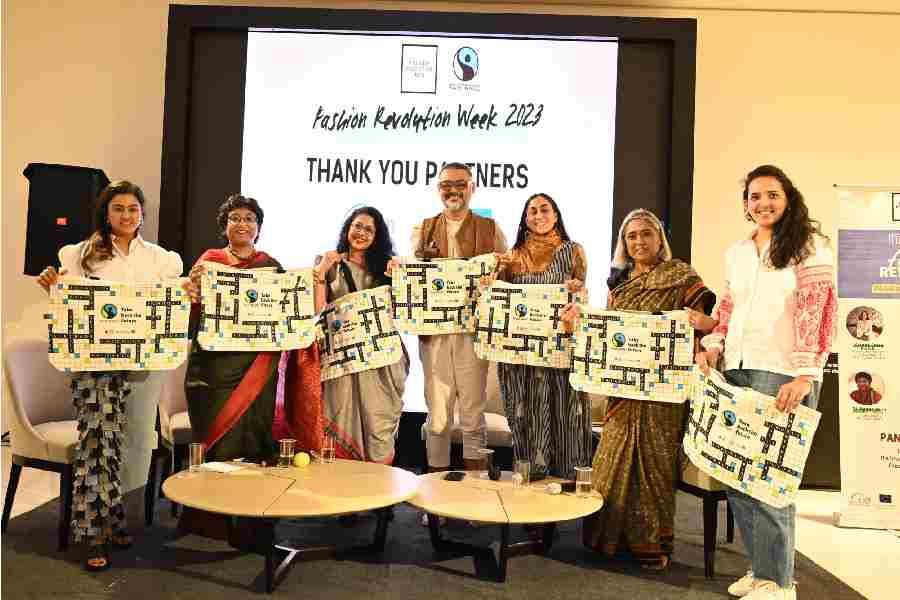Fashion Revolution India, which ‘campaigns for a better fashion industry’, celebrated Fashion Revolution Week 2023 from April 22 to 29, with a host of online and offline events, held nationwide. Calcutta saw a panel discussion on ‘Closing the Loop — Importance of Circular Fashion in Creating a Sustainable Future’ held at Kolkata Centre for Creativity, on April 24. Aditi Holani, founder of Shoulder Lab clothing and the city lead of Fashion Revolution India, who moderated the discussion, summed up the dialogue for The Telegraph.
In its advocacy to bring more transparency to the fashion sector and its supply chains, Fashion Revolution India Kolkata hosted a series of events across the city to emphasize the importance of #WhoMadeMyClothes and how mending and caring for our clothes is an essential part of being sustainable.
We held a panel discussion on April 24, which also marked 10 years to the Rana Plaza incident (Rana Plaza was a multi-storey factory in Bangladesh that came crashing down, killing 1,134 people, in 2013), to address the importance of closing the loop and how circular fashion is imperative for a sustainable future. Our panellists were an interesting bunch. Karuna Ezra Parikh, poet, author, activist, and co-founder of The Burlap People, whose conscious values and interest in the spectrum of human experience are reflected in her work. Roopa Mehta is the CEO of Sasha. They provide business support inputs and market access for sustainable livelihoods to artisan groups based largely in rural communities. Swarup Dutta, a multidisciplinary art and design practitioner, educator, photographer and scenographer, has been teaching for more than a decade in the top fashion colleges and has also been working on various government projects on design intervention and training. Meghna Nayak is the founder of LataSita, a design studio creating zero-waste and ethically produced fashion using a closed-loop supply chain. Nayan Mitra, founder, Sustainable Advancements, is an international authority on the subject of sustainability, CSR and corporate governance. She is the founding president of the Women’s Indian Chamber of Commerce and Industry.
The conversation was Zen-like about one of the world’s major problems: waste. We heard how they are trying to become circular and localised in their practice and create interventions in the local fashion industry towards a system-level change and a sustainable fashion future.
Some of the key issues that were discussed included the trends in the current fashion ecosystem and bringing focus on circularity. Karuna threw light on how we can leverage technology for transformative change for impact within the fashion industry and “reform” at large. She spoke rather candidly on greenwashing; policies brands adopt for the sake of sustainability, thereby giving us all a reality check. Swarup spoke on the value chain and prices that make sustainability for elites and had an interesting take on building a sustainable lifestyle through very simple methods. Be a “reducitarian” said Meghna Nayak who spoke on de-growing in a fast-paced industrial world. Meghna also spoke on sustainability in the fashion industry, inventory balance and supply chains. Nayan’s mantra was to do the best we can in order to further grow within our capacity. She went on to talk about governments’ green policy, taxation, GST and the UN system entities that accelerate the implementation of sustainable development goals. Roopa Mehta continued to talk about mutuality and transparency, spotlighting innovative partnerships within the handicrafts industry to transition to a circular fashion ecosystem.
Sustainable fashion and the circular economy go hand in hand. In the discussion on closed-loop fashion, we covered advanced, practical, and holistic tools that can help apparel and textile industry stakeholders to understand, plan and implement circular business processes. It also helped consumers understand their own patterns, implement quick hacks and take small actions.
We all were on the same page that circular fashion doesn’t happen in a day: it requires a change of mindset, innovation and new approaches.
We also did events like mending workshops and organised a slow fashion tour the same week.
